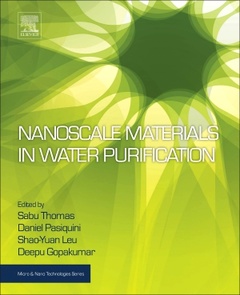Nanoscale Materials in Water Purification Micro and Nano Technologies Series
Coordonnateurs : Thomas Sabu, Pasquini Daniel, Leu Shao-Yuan, Gopakumar Deepu A

Novel nanoscale materials are now an essential part of meeting the current and future needs for clean water, and are at the heart of the development of novel technologies to desalinate water. The unique properties of nanomaterials and their convergence with current treatment technologies present great opportunities to revolutionize water and wastewater treatment. Nanoscale Materials for Water Purification brings together sustainable solutions using novel nanomaterials to alleviate the physical effects of water scarcity.
This book covers a wide range of nanomaterials, including noble metal nanoparticles, magnetic nanoparticles, dendrimers, bioactive nanoparticles, polysaccharidebased nanoparticles, nanocatalysts, and redox nanoparticles for water purification. Significant properties and characterization methods of nanomaterials such as surface morphology, mechanical properties, and adsorption capacities are also investigated
Introduction for nanomaterials :-state of art, new challenges and opportunities Sabu Thomas, Daniel Pasiquini, Shao-Yuan Leu and Deepu Ambika Gopakumar 1. Nanocellulose based membranes for water purification Deepu Ambika Gopakumar, Daniel Pasiquini, Sabu Thomas and Shao-Yuan Leu 2. Polymer /carbon Nanotubes Mixed Matrix membranes for water purification Mohammad Hossein Davood Abadi Farahani Vahid Vatanpour 3. Dendritic Polymer Enhanced Ultrafiltration Michael Arkas 4. Development of Mixed Matrix Membranes: Incorporation of Metallic Nanoparticles in Polymeric membranes Jorge Garcia-Ivars 5. Water Treatment by Molecularly Imprinted Materials Costas Kiparissides 6. ElectrospunNanofibrous Filtration Membranes Irene Bonadies 7. Electrospinning: A versatile fabrication technique for nanofibrous membranes for use in desalination Shiao-Shing Chen 8. Electrospun Nanofibrous Filtration Membranes for Heavy metals and dyes removal Pratima Solanki 9. Electrospinning: A fiber fabrication technique for water purification Maria Wasim, Aneela Sabir and Tahir Jamil 10. Carbon Nanotubes Based Membranes for water purification Jieun Lee 11. Carbon Nanotubes for Advancing Separation Membranes Xuan Zhang 12. Carbon Nanotube and Grapheme oxide Based Membranes Aneela Sabir and Tahir Jamil 13. Graphene-based materials for water purification Alireza Khataee 14. Iron oxide nanomaterials for water purification Andrews Grace 15. Iron oxide nanomaterials for the removal of heavy metals and dyes from waste water Mubarak Mujawar 16. Magnetic metal/metal oxide nanoparticles and their nanocomposites material for the removal of the water pollutants Manash Ranjan Das Sr. 17. Surface modifiications of Magnetic nanoparticles for water purification Luís Carlos de Morais 18. Magnetic nanoparticles for water purification Konstantinos Simeonidis 19. Noble metal nanoparticles for water purification Ewa Kowalska 20. Semiconductor Photocatalysis for water purification Carolina Belver 21. Recent advances in Photocatalytic Detoxification of water Suresh Pillai 22. Semiconductor photocatalysis for water purification Youji Li Sr. 23. Nanoscale Materials for Arsenic Removal from Water Abhijit Maiti 24. Challenges and opportunities of Graphene-based materials in current desalination and water purification technologies Shadi W. Hasan
Daniel Pasquini is an Associate Professor and Researcher at the Chemistry Institute of the Federal University of Uberlândia, Uberlândia-MG, Brazil. He has edited 7 books, and published more than 25 publications in indexed journals, 12 book chapters and more than 85 works in conferences. His research interests include: polymers from renewable sources, vegetal macromolecules; cellulosic fibers; composites; nanocellulose and nanocomposites.
Shao-Yuan (Ben) Leu is Assistant Professor in the Department of Civil and Environmental Engineering at Hong Kong Polytechnic University, Hong Kong. His research focuses on the treatment of waste water.
Deepu A. Gopakumar works as Post-doctoral fellow at School of Industrial Technology, Universiti Sains Malaysia, Penang, Malaysia. His research focuses on nanocellulose-based polymer membranes for water treatment.
- Explains how the unique properties of a range of nanomaterials makes them important water purification agents
- Shows how the use of nanotechnology can help create cheaper, more reliable, less energy-intensive, more environmentally friendly water purification techniques
- Includes case studies to show how nanotechnology has successfully been integrated into water purification system design
Date de parution : 11-2018
Ouvrage de 890 p.
19x23.3 cm


